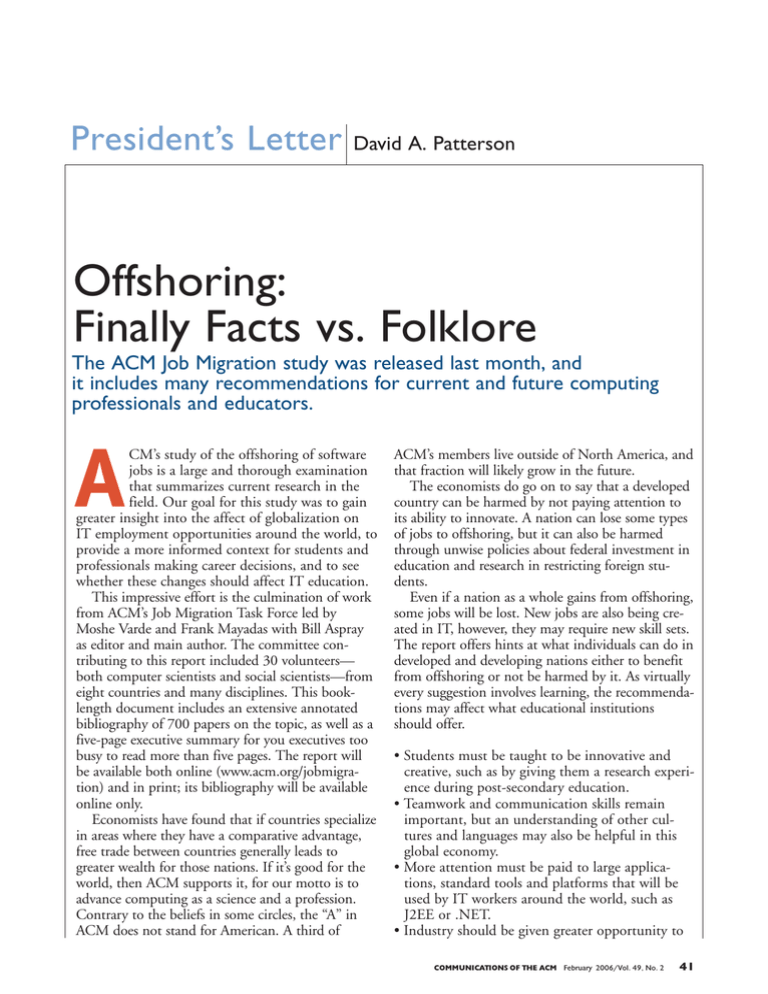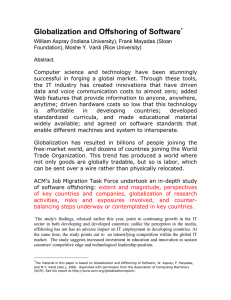Offshoring: Finally Facts vs. Folklore President’s Letter
advertisement

President’s Letter David A. Patterson Offshoring: Finally Facts vs. Folklore The ACM Job Migration study was released last month, and it includes many recommendations for current and future computing professionals and educators. A CM’s study of the offshoring of software jobs is a large and thorough examination that summarizes current research in the field. Our goal for this study was to gain greater insight into the affect of globalization on IT employment opportunities around the world, to provide a more informed context for students and professionals making career decisions, and to see whether these changes should affect IT education. This impressive effort is the culmination of work from ACM’s Job Migration Task Force led by Moshe Varde and Frank Mayadas with Bill Aspray as editor and main author. The committee contributing to this report included 30 volunteers— both computer scientists and social scientists—from eight countries and many disciplines. This booklength document includes an extensive annotated bibliography of 700 papers on the topic, as well as a five-page executive summary for you executives too busy to read more than five pages. The report will be available both online (www.acm.org/jobmigration) and in print; its bibliography will be available online only. Economists have found that if countries specialize in areas where they have a comparative advantage, free trade between countries generally leads to greater wealth for those nations. If it’s good for the world, then ACM supports it, for our motto is to advance computing as a science and a profession. Contrary to the beliefs in some circles, the “A” in ACM does not stand for American. A third of ACM’s members live outside of North America, and that fraction will likely grow in the future. The economists do go on to say that a developed country can be harmed by not paying attention to its ability to innovate. A nation can lose some types of jobs to offshoring, but it can also be harmed through unwise policies about federal investment in education and research in restricting foreign students. Even if a nation as a whole gains from offshoring, some jobs will be lost. New jobs are also being created in IT, however, they may require new skill sets. The report offers hints at what individuals can do in developed and developing nations either to benefit from offshoring or not be harmed by it. As virtually every suggestion involves learning, the recommendations may affect what educational institutions should offer. • Students must be taught to be innovative and creative, such as by giving them a research experience during post-secondary education. • Teamwork and communication skills remain important, but an understanding of other cultures and languages may also be helpful in this global economy. • More attention must be paid to large applications, standard tools and platforms that will be used by IT workers around the world, such as J2EE or .NET. • Industry should be given greater opportunity to COMMUNICATIONS OF THE ACM February 2006/Vol. 49, No. 2 41 President’s Letter participate in model curriculum development, as there has been rapid change in software development. In addition, a more global perspective should be taken in preparing the model curricula and it should be updated more often than once a decade. In case you thought all IT jobs could migrate, the reports points out that several types of work are not readily offshored: • Work that has not been routinized; • Work that if offshored would result in the procuring company losing too much control over critical operations; • Situations in which offshoring would place the procuring company at too great a risk to its data security, data privacy, or intellectual property and proprietary information; or • Business activities that rely on an uncommon combination of specific application-domain knowledge and IT knowledge in order to do the work properly. Although these guidelines are a bit vague, you may be able to discern concrete actions by studying the 11 case studies of offshoring in the report. They include software service firms in low-wage nations, and four types of firms in high-wage nations: packaged software firms, software service firms, entrepreneurial start-up firms, and established firms outside the IT sector. Even though developing nations are improving the software skills of their programmers to handle strategic tasks, for the reasons noted here, there are some tasks that companies may be reluctant to offshore, or at least not assign outside of their organization. The report also explores the risks that offshoring may pose to privacy, security, and intellectual property. In fact, offshoring creates risks to governments of failing critical infrastructures such as power and telephone systems, and loss of faith of citizens in the ability of the government to function properly. It causes risks to companies of the integrity of its corporate data, the security of its proprietary information, and loss of assurance of business continuity. It 42 February 2006/Vol. 49, No. 2 COMMUNICATIONS OF THE ACM causes risks to individuals of privacy loss and identity theft. Proactive measures must be taken to control these risks, though it is unlikely they can be eliminated. The report itself is fascinating, and it includes many surprising facts. For example, did you know that India produces fewer than 50 Ph.D.s in computer science each year, which is fewer than the number produced in the San Francisco Bay Area? As I stated before in this column, I am thrilled this study provides real facts, because the folklore about offshoring is affecting career decisions by young people. The U.S. has been a pioneer in offshoring of IT jobs, yet U.S. government statistics show IT employment is at an all-time record, even higher than during the dot-com boom [1]. Annual job losses to outsourcing have been no more than 2%–3% of the U.S. IT work force—and probably less. Hence, apparently the overall IT job growth is greater than 3%, which is plausible. Friends at Silicon Valley start-ups are beginning to recruit programmers from new college graduates via college placement centers—a practice start-ups have been reluctant to employ in the past. Like Bill Gates [2], I believe we have only scratched the surface of the potential of IT, and that the challenges and opportunities of the next 50 years will be just as exciting as the last 50 years. It would be a shame if inaccurate assumptions led young people to make career decisions they would later regret. My hope is that this report will reshape conventional wisdom in both the computing discipline and the profession. Please take a look, and share your thoughts with others. c References 1. Patterson, D.A. Restoring the popularity of computer science. Commun. ACM 48, 9 (Sept. 2005), 25–28. 2. Powell, A. Gates looks into the future. Harvard Gazette (Mar. 04, 2004); www.news.harvard.edu/gazette/2004/03.04/03-gates.html. David A. Patterson (pattrsn@eecs.berkeley.edu) is president of ACM and the Pardee Professor of Computer Science at the University of California at Berkeley. © 2006 ACM 0001-0782/06/0200 $5.00








